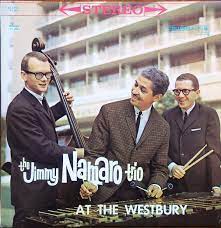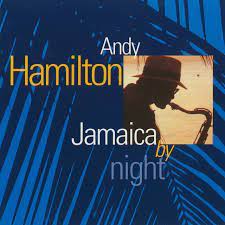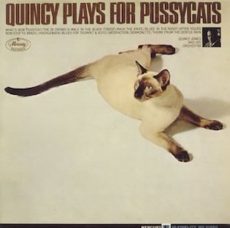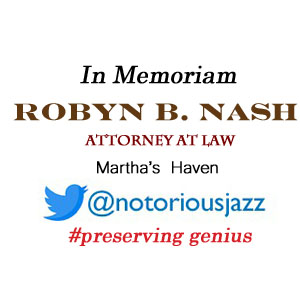
Daily Dose Of Jazz…
Jimmy Namaro was born James Namaro on April 14, 1913 in La Rosita, Mexico however, his family moved to Hamilton, Ontario in 1921. This is where he studied piano with Sid Walling and Eric Lewis.
He made his radio debut as a marimba player on CHML, Hamilton, and was heard in his teens on CFRB, Toronto, and on the CBC. In 1933, he was assistant conductor of a marimba band at the Chicago World’s Fair. Namaro subsequently pursued dual careers as the leader of pop or light jazz trios and quartets in nightclubs in Toronto, Canada and New York and as a popular CBC radio performer.
As a member of the Happy Gang from 1943 to 1959, he was also bandleader or soloist on several other CBC radio and television programs before moving to the United States in the Seventies. He was music director for Frankie Laine 1978-1993, with whom he toured the USA, Canada, and the UK. Namaro moved to Richmond, British Columbia, in 1987, where he continued to compose and to work with Laine.
His discography includes LPs Between 1958 and 1972 he recorded for Sparton, RCA Victor, Quality, Camden and others originally produced by the Canadian Talent Library Trust (CTL). Namaro wrote many jingles and composed music for CBC dramas such as the TV series Seaway, for the Broadway production Andorra, and for ballet. His paintings, in the primitive style, have had several exhibitions.
Vibraphonist, marimbist, percussionist, composer, painter Jimmy Namaro, who was naturalized Canadian around 1945, transitioned in Richmond, British Columbia on April 25, 1998.
More Posts: bandleader,composer,history,instrumental,jazz,marimba,music,percussion,vibarphone

Daily Dose Of Jazz…
John Paul Pizzarelli Jr. was born April 6, 1960, in Paterson, New Jersey and started playing guitar when he was six He attended Don Bosco Preparatory High School, an all-boys Catholic school. In his teens, he performed with Benny Goodman, Les Paul, Zoot Sims, Slam Stewart, and Clark Terry.
He played trumpet through his college years, attending the University of Tampa and William Paterson University, but his most important teacher was his father through the Eighties. During that period he established himself as a jazz guitarist and a vocalist and released his debut solo album, I’m Hip (Please Don’t Tell My Father) in 1983.
During the 1990s, Pizzarelli played in a trio with Ray Kennedy and his younger brother Martin. In 1993, the trio opened for Frank Sinatra in Las Vegas, Nevada and four years later, he was starring on Broadway in Dream, a show devoted to the music of Johnny Mercer.
Naming Nat King Cole as the inspiration for his career, he has honored him with the albums Dear Mr. Cole and P.S. Mr. Cole. He has also recorded tribute albums to Frank Sinatra, Duke Ellington, Antônio Carlos Jobim, Richard Rodgers, and Paul McCartney. Along with his father accompanying Annie Ross, they recorded her album To Lady with Love, a tribute to Billie Holiday that Ross recorded when she was eighty-four.
He has hosted a national radio show, Radio Deluxe with John Pizzarelli, and has worked with George Shearing, Rosemary Clooney, Johnny Frigo, Buddy DeFranco, the Clayton-Hamilton Jazz Orchestra, the Boston Pops Orchestra, and the Cincinnati Pops Orchestra.
As a co-producer of the James Taylor album American Standard, he received a Grammy nomination for Best Traditional Pop Vocal Album in 2020. Guitarist and vocalist John Pizzarelli continues to explore and expand his musical vocabulary.
More Posts: bandleader,guitar,history,instrumental,jazz,music,vocal

Daily Dose Of Jazz…
Jørgen Emborg was born in Copenhagen, Denmark on March 29, 1953 and was influenced by Bill Evans, Herbie Hancock and Keith Jarrett.
He has played at international festivals since 1975, releasing his first album, Sargasso in 1979 on the Kong Pære label. In the following years he belonged to Six Winds with Marilyn Mazur, Uffe Markussen and Alex Riel and formed with Palle Mikkelborg, Bjarne Roupé, Bo Stief and Ole Theill the ensemble Alpha Centauri.
By1986 he recorded with Bjarne Rostvold and through the Nineties he performed and/or recorded with Thomas Hass and Tomas Franck. Emborg teamed up with Alex Riel again and recorded Over The Rainbow on the Storyville label, with the saxophonist Fredrik Lundin, the bassist Steve Swallow. He played in the Tolvan Big Band and the Per Carsten Quintet.
Jørgen has also composed music for children, rhythmic choir music, big band, a cappella work, ironworks and piano quizzes. He taught piano, theory and composition at the Rytmisk Conservatory of Music from 1988 to 2016.
In 1981, his LP en 20:33 with Alpha Centauri received an award from Statens Kunstfond, the State Art Foundation. He received the Ben Webster Prize with the Frontline Fusion Group as well as others.
Pianist and composer Jørgen Emborg, who ensures there is a Nordic feel to his compositions, continues to perform and compose.
More Posts: bandleader,composer,history,instrumental,jazz,music,piano

Daily Dose Of Jazz…
Andy Raphael Thomas Hamilton was born on March 26, 1918 in Port Maria, Jamaica, and learnt to play saxophone on a bamboo instrument. He formed his first band in 1928 with friends who played oil drums and Hamilton a bamboo saxophone. He was influenced by Duke Ellington and Count Basie and by the Kingston-based bands of Redver Cook and Roy Coburn.
Spending some time in the United States Andy worked as a cook and farm labourer, while having short jazz residencies in Buffalo and Syracuse, New York. Returning to Jamaica he worked as musical arranger for Errol Flynn at his hotel The Titchfield, and on his yacht the Zaka.
Emigrated as a stowaway to the United Kingdom in 1949 and eventually lived and worked in Birmingham, England. By day he worked in a factory, by night he played jazz with his own group, the Blue Notes that included fellow Jamaican pianist Sam Brown. Besides playing mainly local gigs, Hamilton booked an early Steel Pulse and numerous Jamaican bands around town before establishing a regular weekly venue in Bearwood. There he invited visiting musicians such as Joe Newman, Al Casey, Teddy Edwards, Art Farmer, Harry Sweets Edison, and David Murray. He fronted weekly gigs on Thursday nights at Bearwood Corks.
Having recovered from a diabetic coma in 1986, he celebrated his 70th birthday in 1988 playing at his regular venue, The Bear. He performed at the Soho Jazz Festival, and in 1991 at the age of 73, Andy made his first ever recording with Nick Gold, Silvershine on World Circuit Records. It became the biggest selling UK Jazz Album of the Year, The Times Jazz Album of the Year, and one of the 50 Sony Recordings of the Year. It was followed two years later by Jamaica at Night.
He continued to play, teach and promote music even as he approached his 94th birthday. Saxophonist Andy Hamilton, who in 2008 was appointed Member of the Order of the British Empire (MBE), transitioned peacefully on June 3, 2012
More Posts: bandleader,history,instrumental,jazz,music,saxophone

Daily Dose Of Jazz…
Santo J. “Sonny” Russo was born on March 20, 1929 in New York City, New York and grew up in a musical family, both his father and grandfather were professional horn players. He first played piano and violin, and played with his father’s group at age 15, before settling on the trombone.
The consummate sideman, through the late Forties he started out playing with Buddy Morrow in 1947, Lee Castle in 1948, Sam Donahue in 1949, and Artie Shaw in 1949–50. The 1950s saw him performing with Art Mooney, Tito Puente, Jerry Wald, Tommy Tucker, Buddy Rich, Ralph Flanagan, the Sauter-Finegan Orchestra, Neal Hefti, Jimmy Dorsey, Tommy Dorsey, and Maynard Ferguson.
For a short period during the mid-1950s Russo found work in the bands of various Broadway shows, then in the late 1950s and 1960s he worked with Louie Bellson, Machito, Bobby Hackett, Benny Goodman, and Doc Severinsen. From 1969to 1972 he was a member of The Tonight Show orchestra, and he worked with Frank Sinatra from 1967 to 1988.
He played on Urbie Green’s 21 Trombones, soloed on numerous others, and toured with The World’s Greatest Jazz Band. Sonny recorded extensively with Jimmy Rushing, Tony Bennett, Lena Horne, Perry Como, Dinah Washington, Liza Minnelli, Elvis Presley, Paul Anka, Ray Charles, Steve Lawrence, and Eydie Gorme. He performs on the soundtracks to the films The Godfather, The Godfather II, Goodfellas, and Sophie’s Choice, and in 1971 on The Tonight Show he shared the stage with Louis Armstrong, playing the solo on Someday You’ll Be Sorry.
A fixture in the recording studios for radio and television, he was a regular in the Orchestra for Jerry Lewis’s Muscular Dystrophy Telethon in New York City. Always in demand he continued to work with Lewis on his one-man show, toured around the world with Sinatra who announced his playing a trombone solo on the tune I’ve Got You Under My Skin.
He has also done many gigs with the likes of Al Cohn, Zoot Simms, Mousey Alexander, and Milt Hinton. Trombonist Sonny Russo, a graduate of the Manhattan School of Music, transitioned on February 23, 2013.
More Posts: history,instrumental,jazz,music,trombone



